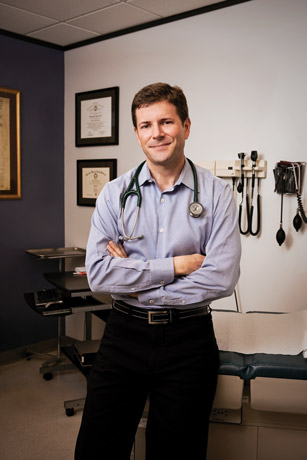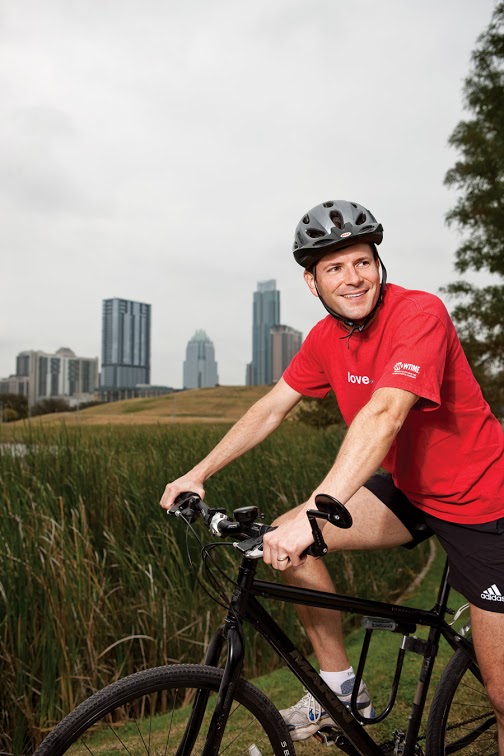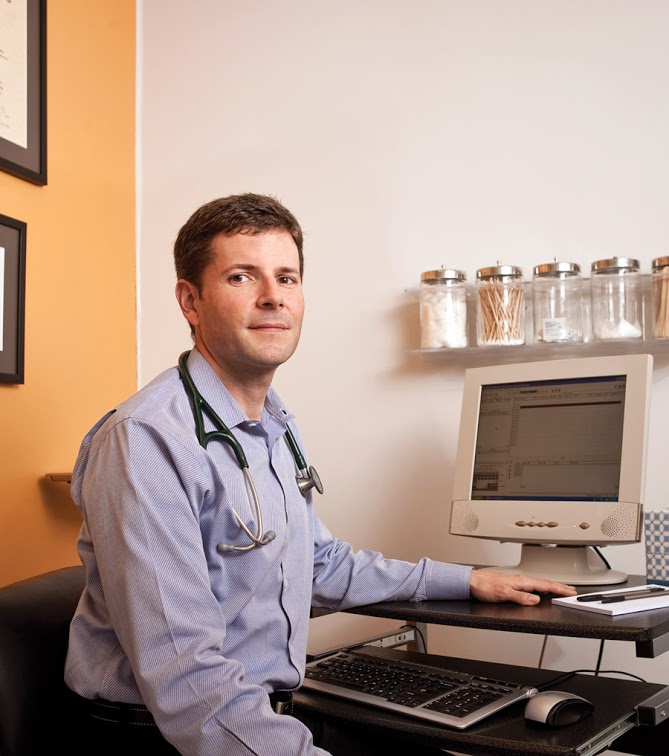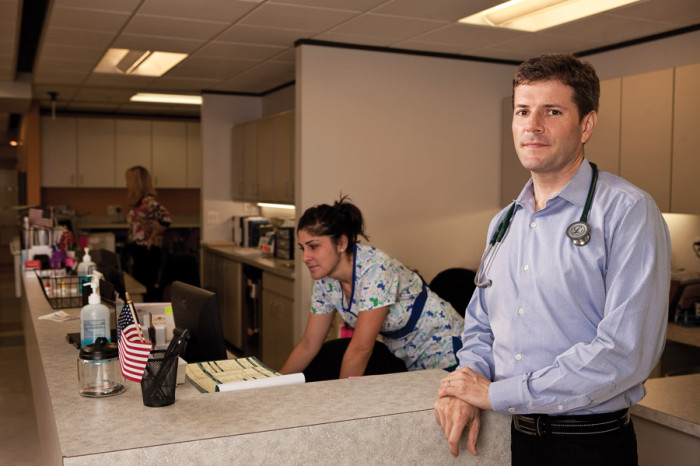When you’re visiting the doctor, whether it’s because of severe allergies, the common cold, or simply for a basic checkup, you are fundamentally unguarded. In the American health care system, with its fee-for-service model, patients are frequently put into the role of consumer and left to fend for themselves. They face a barrage of competing, conflicting questions: What test is actually necessary? Will my insurance cover that? What lifestyle changes should I make? For the country’s 50 million uninsured residents, complications grow exponentially. The power differential of the doctor-patient relationship is on vivid display.
“People who come to you, as patients, are in a vulnerable place,” said Dr. Todd Canon.
He related the story of a recent patient in her 60s who was diagnosed with leukemia. When she came in for her second visit, she was very sick, so he coordinated what needed to happen so that she could get right into the hospital’s oncology unit and bypass the emergency room. “The next day, the oncologist called and said, ‘If she had waited another two weeks to come in to see you, she’d be dead, because it was escalating so quickly.’ That slapped me in the face. It was a stark reminder of the vulnerability of patients,” said Canon.

Photography by Michael Thad Carter
His sensitivity and compassion aren’t limited to his patients at the South Austin Medical Clinic, where he works with people of all ages as a family physician.
A longtime friend, Karen Casko, said that Canon steered her and her family through a difficult time when her mother, before dying just shy of her 70th birthday in December 2008, was sick with heart disease and its resulting pulmonary complications. As her mother’s health declined over the last year and a half of her life, Canon helped Casko’s family make sense of what the doctors were saying while providing timely advice and lending an understanding ear.
“After any troubling doctor visit, my father and my sister would inevitably say, ‘call Todd and see what he has to say,’” said Casko, who attended Austin College in Sherman, Texas, with Canon. “His generosity was something we all treasured when things weren’t going well. He maintained an incredible balance of honesty and compassion.”
Those two characteristics also link Canon to his upbringing, his family, and in particular, to the one woman whose unwavering support he could count on throughout his life: his grandmother. “I can’t think of another person in my life who has always stood be- hind me a hundred percent, no matter what happened. That’s a bold statement, because I’ve had a lot of won- derful relationships,” said Canon. “I always knew that whatever was happening, she was going to support me.”
When Canon was in the process of coming out to his family, while attending the University of Texas Health Science Center in San Antonio for his medical degree, his grandmother—in her early 80s at the time—respond- ed to the news this way: “She said, ‘Well Todd, why didn’t you tell me sooner?’ That was that. She wanted to meet the person I was dating, and shortly thereafter she did,” he said, adding that his grandmother was the first family member he and his partner of 16 years, Perry Heitman, spent the night with back in 1995. Her daughter, Canon’s biological mother, died when he was only a year old, and his father remarried by the time he was three. “For my grandmother, our relationship was valuable and she was going to love me no matter what.”
This self-confessed nerd took college seriously, study- ing when other students, including friends, were goofing off. One such friend, Holli Pryor-Baze, met Canon during her freshman year at Austin College, where Canon majored in biology, and would often suggest a trip to the movies or the mall instead of cramming for exams.
“I would ask until he gave in, but he would set boundaries,” Pryor-Baze confided. “He worked hard not to hurt my feelings, but I was probably a pain. After study time was up, we’d have a wonderful time and he would be one hundred percent involved in what we were doing.”

Photography by Michael Thad Carter
A Modern Commute
When the stress of work gets to him, Canon turns to exercise for relief. The morning of our interview, Canon had just finished working out. “When I’m having a really crazy day, and we all have them, at the end of it I’m either going to pull my hair out or go and exercise,” he said, adding that he was heading to San Antonio the next morning for a half-marathon.
He recalled the beginning of his interest in running when he noticed a cute guy—a runner—during his high school years. Later, he started cycling and weight training, and now he exercises six or seven days per week, jogs often on Lady Bird Lake, and bikes to work in South Austin from his home in Clarksville.
As a frequent bike commuter and pedestrian, Canon has at times been frustrated by Austin’s “car-centric” infrastructure and attitudes. Simply put, Austin is set up to benefit people who drive cars: From the sprawling nature of its development to its lack of a dedicated and connected system of bikeways and bike facilities, there’s certainly room for improvement. “Here—not just Austin, it’s true of many American cities—we have designed our city to favor the car. I see it all the time, in attitudes.”
Canon cited examples that are subtle—having to push a button for a walk signal at major intersections—and more blatant: “As a biker, I’ve approached an intersection and started to slow down—and a car will just zoom in front of me,” he said, expressing the frustration that many have felt as the city continues its relentless growth. “Why? Because they could.”
Still, he’s optimistic that city residents will eventu- ally adopt more bike- and pedestrian-friendly attitudes and vote for the necessary infrastructure improvements going forward. “It gets back to my role as a physician: When you have to get into your car to get around, that’s not healthy.”
Despite the aforementioned moments of exasperation, Canon emphasized that he has come to love Austin for a range of reasons since relocating to the city a year and a half ago. After living in Portland, Oregon, for 12 years, Canon and Heitman were seeking warmer and sunnier pastures. Though they considered other southern cities, including Atlanta, New Orleans and Houston, they settled on Austin. Canon grew up in Fort Worth (his family is still there) and lived in San Antonio while attending medical school.
“We’ve found Austinites very welcoming from our first days here,” said Heitman, a lawyer who practices in the administrative hearings section of the Comptroller of Public Accounts. “I’m feeling increasingly comfort- able calling Austin home.”
Gay Rights = Human Rights
“Portland is where I became a gay activist, so part of my heart is always there,” Canon said, adding that Portland’s gay community was very engaged, with a vibrant gay and lesbian center and an active chapter of the Human Rights Campaign, the nation’s largest LGBT civil rights organization.
Active in the HRC for almost a decade, Canon’s earliest memory of the organization is receiving a mailer in the mid-1990s bearing photographs of several openly gay celebrities, including Olympic diver Greg Louganis (Celebrity on page 12) and singer Melissa Etheridge. It seemed like a big deal at the time and he was impressed.
During medical school in San Antonio, he attended an event where Elizabeth Birch, then-president of the HRC, was a guest. Although he enjoyed it and learned a lot more about the organization, it wasn’t until after he finished his three-year residency at Oregon Health and Science University Family Medicine in 2001, that he became more involved.
The couple had friends who were Federal Club members, and it was a role they’d given consideration to. Federal Club members donate a minimum of $100 per month to the civil rights behemoth, which is headquartered in Washington, D.C. Not long after, while attending the HRC Gala Dinner in Seattle with a group of friends from Portland, Heitman, Canon and their cohort wondered aloud why the HRC chapter in Portland wasn’t as active and organized as its neighbor to the north. They vowed to do what they could to rebuild and reenergize the chapter in Portland.
“We’re both political junkies,” said Canon, a self- confessed NPR listener and reader of Politico. “Perry even more so than me.”
Canon works long hours as a volunteer for the HRC to maintain a healthy and effective steering committee in Austin. He’s currently in his fifth year as a member of the Board of Governors, which is the governing body of the HRC steering committees. He also keeps a clear-eyed perspective about the group. “By no stretch is it a perfect organization; I don’t think any organization is,” he said.
“But over time Perry and I realized that by and large, as an organization, it was doing great work to advance our rights. There wasn’t any group of that stature that was able to do as much and has been able to do since.”
“I am committed to it because I believe that the success of HRC is related to the direct efforts of its volunteers and the willingness of people like us to contribute the finan- cial resources necessary to its mission,” Heitman added.
Persistence Pays Off
“The hardest part of medical school was coming out,” said Canon. “I was an emotional wreck!”
Never mind the exams and late nights studying, for him the hardest part was coming to terms at the age of 24 with something he’d been aware of for many years prior to that point. Although he stewed over it for a very long time—he isn’t sure what took so long—once he got to medical school, there was no turning back.
“I don’t know why, it seemed like when I went to medical school that [coming out] was going to happen whether I wanted it to or not,” he said.
After coming out in the fall semester of his first year, he met the man who would become his life partner while attending the WEBB Party, a major annual fundraiser for the San Antonio AIDS Foundation. Heitman, in town from Atlanta to visit friends, was at the same party as Canon. Their initial connection wasn’t exactly something that Carrie Bradshaw would imagine.
“Sparks flew, but mostly because I was rude to him,” Canon said, laughing at the memory. “I hadn’t dated a lot at that point and I was still nervous. I think he says I walked away after we said where we’re both from—I can’t deny that, I might have.”

Photography by Michael Thad Carter
Heitman’s persistence paid off; after seeing Canon the next night at a bar, they exchanged numbers. Still, some of Canon’s friends weren’t exactly encouraging, because of the long-distance factor. “I was in Fort Worth with my family, and I called my roommate to get his phone num- ber, which I’d written down on a piece of paper, and as we were talking, the other line rings and it was Perry calling for me.”
Their connection was immediate, according to Heitman, who described the longevity of their relationship this way: “Our bond derives from our shared values and mutual respect for each other’s intellect, independence, privacy and emotional well-being,” Heitman said.
“Neither of us feels the need to compete with the other.” Aside from a shared devotion to advancing the cause of LGBT advocacy, the couple enjoys cooking, gardening, entertaining and traveling together. Three years into their relationship, they decided to make it official with a wedding ceremony, officiated by a Lutheran minister, at an outdoor venue in San Antonio in front of some family and friends. At that time, Canon’s parents were still uncomfortable having a gay son and did not attend the ceremony. Canon was quick to state that things have completely changed since then: “Now, if I go home without Perry, they’re like, ‘Why didn’t you bring Perry?”
His parents were the most challenging part of coming out, and it was based on his fear of rejection and their discomfort. However, deep down Canon believes they knew he was gay. From a very early age, he can recall the reaction he had on the rare occasion he would see a guy with his shirt off; he felt a connection to him.
Challenges & Rewards
Nowdays Canon said the biggest challenge facing the LGBT equality movement is connecting with straight allies. He believes that the majority of Americans are with gay and lesbian people on the core issues—so long as there’s an education component.
“There are a lot of people who’re on our side, but don’t understand what rights we don’t have. It’s not uncommon for me to talk with very educated, progressive straight people who don’t know that you can be fired in Texas for being gay,” said Canon. “They’re like, ‘It can’t be true.’ You can just see the disconnect.”
Other than his passion for social justice in the realm of civil rights, he was noticeably indignant when he dis- cussed the country’s health care challenges. “For me, it is an utter outrage that we live in one of the wealthiest countries in the world and yet, one out of every four Texans has limited access to basic health care. I can’t even fathom how anyone thinks that’s okay.”
Canon added that he believes it’s the single most impor- tant challenge facing the state and the country. Working the long hours of a doctor, maintaining a strong relation- ship, and staying active in the struggle for LGBT equality would seem like a lot to balance, but Canon handles it with aplomb.
“As an adult, Todd has continued his balance of work and play—he works hard in his practice and is one hundred percent devoted to his patients, and he makes time for the HRC, physical fitness and friends,” said longtime friend Pryor-Baze. “He works hard to meet the needs of those around him, without hurting their feelings when he needs to set boundaries with his time.”
The couple is also in the midst of building a new home in Clarksville (their architect, Tim Cuppett, is featured in Home on page 38), and they’re hoping to move in later this spring.
Although they don’t plan to start a family—Canon said he’s fortunate to have great relationships with his niec- es and nephews—they are putting down roots in Austin.
“I expect Todd and I will be more in love, actively pursu- ing our careers, and enjoying our new home with family and friends,” Heitman said. “Todd is a generous, considerate and passionate man. I aspire to be the same, but I often fall short.”
“I’m passionate about healthy communities and civil rights,” Canon said. “I have a great career, a great activist volunteer life, a great relationship and family that I love. I feel very blessed in this life.”




































